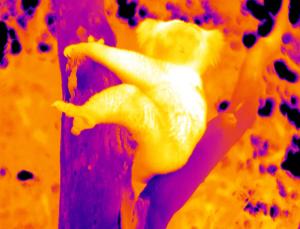New research sheds light why koalas (Phascolarctos cinereus) spend so much time hugging trees. As shown in the infrared image above, the trees stay cool on hot days. Since koalas do not sweat, hugging trees is another method to keep their cool in addition to panting and licking their fur. The research also shows that the animals who hug trees lose less water through evaporation that those that do not hug trees.
I think I might need to start hugging trees this summer.
Source:
Briscoe NJ, Handasyde KA, Griffiths SR, Porter WP, Krockenberger A, Kearney MR. Tree-hugging koalas demonstrate a novel thermoregulatory mechanism for arboreal mammals. Biology Letters. 10: 20140235, 2014. doi: 10.1098/rsbl.2014.0235

